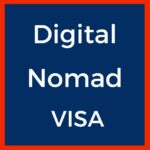2024-01-08BY Immikorea

Digital Nomad Visa Enforcement (2024.1.1)
The Digital Nomad Visa has been in effect since January 1, 2024 in South Korea.
Until now, foreigners visiting South Korea who were able to work remotely from abroad wanted to stay in the country for a long period of time to combine work and vacation, but they could only enter the country with a tourist visa or a short-term visa, which allowed them to stay for a short period of time of 90 days or less.
The Digital Nomad Visa was created to address this inconvenience.
Digital Nomad Visa (F1 Visa) Requirements
The Digital Nomad Visa is currently being piloted and there is some confusion. Here are the basic requirements
Where to Apply for a Digital Nomad Visa
- South Korean embassies and consulates abroad
- Immigration office with jurisdiction over your domestic address (if you change your visa status domestically)
Who is eligible for a Digital Nomad Visa
- Foreigners who are affiliated with an overseas company and can work remotely and have worked in the same industry for at least one year.
- Families can apply too
- 18 years of age or older (except for dependent children)
Applicant income requirements
- The applicant’s previous year’s income was more than twice the Korean per capita gross national income (GNI) (approximately 85,000,000 korean won).
Health insurance requirements
- Personal medical insurance of at least 100 million won to cover hospital treatment and repatriation during your stay.
Digital Nomad Visa Duration and Status Change
- 1 year granted from date of entry, extendable for 1 additional year (up to 2 years)
- Cannot work in Korea (change to E7 visa when working)
- If you are in Korea on a short-term visa (B1, B2, C3 visa), you can change to a digital nomad visa if your work experience and income meet the requirements.
Digital Nomad Visa Application Documents
- Application for visa issuance (if applying from abroad)
- Unified Application (for domestic applications)
- passport
- passport photo (3.5*4.5 white background)
- Proof of employment (apostille if necessary)
- Proof of income, such as paycheck stubs / account transaction history / bank statement, etc.
- Criminal Record certificate (apostille for domestic applications)
- Certification of private health insurance
- Certification of family relationship (if accompanying family)
*Submission criteria for proof of income and employment may vary by country as it is currently being piloted.





